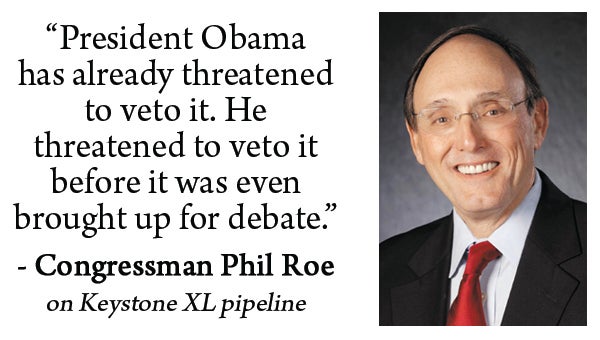Roe explains Congressional initiatives
Published 9:45 am Thursday, January 15, 2015
As Congress works through the first weeks of a new session, one local representative says some key issues are already coming to the forefront.
“We passed a bill on the 40-hour work week,” U.S. Rep. Phil Roe said Wednesday. “The Affordable Care Act defined the work week as 30 hours.”
That provision of the Affordable Care Act had a negative impact on a lot of Americans, Roe said, because in order to avoid penalties, some employers cut the number of hours employees worked.
“This really affected the education field and a lot of part-time teachers,” Roe said.
The bill passed last week by Congress, which is being called the “Save American Workers Act,” would remove the 30-hour penalty from the health care law if it makes it through the Senate and is signed by the president.
One of the other major issues being discussed, Roe said, is the Keystone Pipeline project, which was first proposed in 2008. If approval for the project passes, it would allow Canadian-based energy company TransCanada to begin work on the Keystone XL pipeline, which would be an expansion of the existing Keystone pipeline.
According to the Energy and Commerce Committee of the U.S. House of Representatives Energy and Commerce Committee, the proposed Keystone XL would carry up to 830,000 barrels of oil per day 875 miles from Alberta, Canada to Steele City, Neb. From there, the oil would go to refineries in the Midwest and Gulf Coast. The new pipeline would also transport some of the rapidly-increasing oil production from the Bakken formation in North Dakota and Montana.
The project is estimated to support approximately 42,000 jobs, and would deliver enough oil to substantially reduce imports from the Middle East. Because the pipeline crosses a national border, it requires federal approval in the form of a Presidential Permit.
On Jan. 9, the House of Representatives passed a resolution authorizing construction of the pipeline, and Roe said the project has enough support to pass the Senate as well. However, he added, the threat of a presidential veto looms overhead.
“President Obama has already threatened to veto it,” Roe said. “He threatened to veto it before it was even brought up for debate.”
If the veto happens, Roe said the Senate may have enough votes to override a veto, but he is not sure if the project has enough support in the House to overcome the hurdle. “Two-thirds is a really high bar,” he said.
Members of Congress are also preparing for President Obama’s State of the Union address, which is scheduled for Jan. 20. Roe said he, for one, is expecting more of what the president has said in the past.
“I’m expecting the same speech we’ve always heard,” Roe said. “I’ve heard it now, I guess, seven times. I can almost do it.”
The president is also expected to discuss a national initiative to provide free college tuition, similar to the Tennessee Promise initiative here in Tennessee, during his speech.
“Tennessee is to be applauded, I think we did a good thing,” Roe said. “But, the federal government can’t afford it.
“If the states want to do it I am all for it, but the federal government cannot financially support it.”
Roe has one hope for the speech, which he said is not likely to be the case.
“Hopefully he’ll be positive. I keep hoping that but it never seems to happen,” Roe said. “I hope he will be willing to work with us but that seems unlikely. He’s already threatened to veto the first two things we’re working on.”






